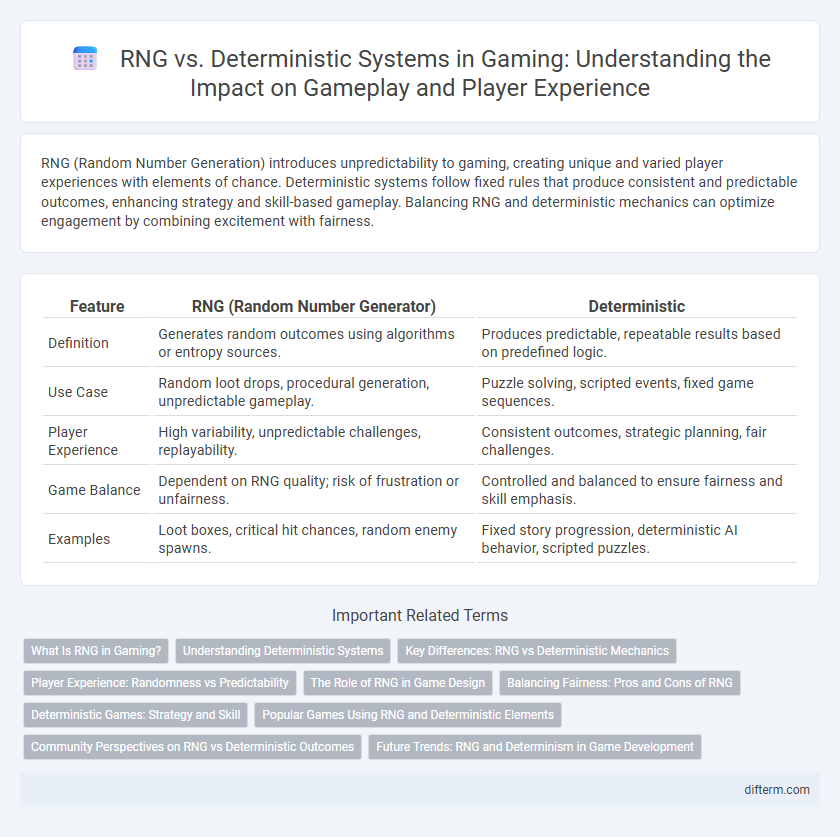RNG (Random Number Generation) introduces unpredictability to gaming, creating unique and varied player experiences with elements of chance. Deterministic systems follow fixed rules that produce consistent and predictable outcomes, enhancing strategy and skill-based gameplay. Balancing RNG and deterministic mechanics can optimize engagement by combining excitement with fairness.
Table of Comparison
| Feature | RNG (Random Number Generator) | Deterministic |
|---|---|---|
| Definition | Generates random outcomes using algorithms or entropy sources. | Produces predictable, repeatable results based on predefined logic. |
| Use Case | Random loot drops, procedural generation, unpredictable gameplay. | Puzzle solving, scripted events, fixed game sequences. |
| Player Experience | High variability, unpredictable challenges, replayability. | Consistent outcomes, strategic planning, fair challenges. |
| Game Balance | Dependent on RNG quality; risk of frustration or unfairness. | Controlled and balanced to ensure fairness and skill emphasis. |
| Examples | Loot boxes, critical hit chances, random enemy spawns. | Fixed story progression, deterministic AI behavior, scripted puzzles. |
What Is RNG in Gaming?
RNG (Random Number Generator) in gaming refers to algorithms that produce unpredictable outcomes, ensuring varied gameplay experiences such as loot drops, enemy behavior, and critical hits. RNG adds an element of chance to gaming, making each player's experience unique and preventing predictability in game mechanics. Developers use RNG to balance difficulty and enhance replayability by incorporating randomness into game events.
Understanding Deterministic Systems
Deterministic systems in gaming operate with fixed rules and predictable outcomes, ensuring consistent player experiences by eliminating randomness. These systems allow developers to design precise challenges and strategies based on guaranteed game mechanics, enhancing skill-based gameplay. Understanding deterministic mechanisms helps players anticipate results and plan their actions effectively, distinguishing them from RNG-based unpredictability.
Key Differences: RNG vs Deterministic Mechanics
RNG (Random Number Generation) mechanics introduce unpredictability through chance-based outcomes, ensuring varied and dynamic gameplay experiences. Deterministic mechanics rely on fixed algorithms or player actions, creating predictable and consistent results crucial for strategic planning. Understanding these differences helps developers balance fairness and excitement in game design.
Player Experience: Randomness vs Predictability
Random Number Generation (RNG) introduces unpredictability in gaming, creating dynamic and exciting player experiences where outcomes vary widely. Deterministic systems offer predictability, allowing players to develop strategies and master mechanics based on consistent results. Balancing RNG and deterministic elements enhances engagement by combining surprise with skill-based progression.
The Role of RNG in Game Design
Random Number Generation (RNG) plays a crucial role in game design by introducing unpredictability and dynamic gameplay elements that enhance player engagement and replayability. Unlike deterministic systems, which follow predefined patterns, RNG ensures each game experience is unique, influencing loot drops, enemy behavior, and procedural content generation. This balance between chance and skill challenges players, fostering strategic decision-making and sustained interest.
Balancing Fairness: Pros and Cons of RNG
Random Number Generators (RNG) introduce unpredictability in gaming, enhancing excitement and replayability by ensuring outcomes cannot be easily predicted. However, RNG can sometimes lead to perceived unfairness, as skillful players might be disadvantaged by chance-based elements. Deterministic systems offer consistent, skill-based results but may lack the dynamic variability that RNG provides, creating a trade-off between fairness and engagement.
Deterministic Games: Strategy and Skill
Deterministic games rely on fixed rules and predictable outcomes, emphasizing player strategy and skill over chance. Success in these games is driven by careful planning, logical thinking, and mastery of gameplay mechanics. Titles like chess and Go exemplify deterministic design where every move impacts the eventual result without randomness.
Popular Games Using RNG and Deterministic Elements
Popular games like Fortnite and Overwatch utilize RNG elements to enhance unpredictability in loot drops and critical hits, creating dynamic gameplay experiences. Conversely, titles such as Tetris and Chess rely on deterministic mechanics where player skill solely influences outcomes, ensuring consistent and fair competition. Many modern games blend both RNG and deterministic systems to balance randomness with strategy, appealing to a wider range of players.
Community Perspectives on RNG vs Deterministic Outcomes
Community perspectives on RNG versus deterministic outcomes in gaming reveal a divide between unpredictability fans and strategy purists. RNG proponents value the excitement and replayability that random elements introduce, fostering dynamic gameplay experiences. Conversely, deterministic advocates argue that predictable systems reward skill and fair competition, minimizing frustration caused by chance.
Future Trends: RNG and Determinism in Game Development
Future trends in game development emphasize a hybrid approach combining RNG (Random Number Generation) and deterministic mechanics to balance unpredictability with player skill. Advanced AI algorithms increasingly integrate RNG elements to create dynamic, personalized experiences while deterministic systems ensure consistency in competitive gameplay. Emerging technologies like procedural generation leverage both RNG and deterministic rules to enhance replayability and adaptive content creation.
RNG vs Deterministic Infographic

 difterm.com
difterm.com